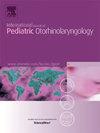Efficacy of a novel narrative intervention program for children with developmental language disorder: A pilot randomized controlled trial
IF 1.2
4区 医学
Q3 OTORHINOLARYNGOLOGY
International journal of pediatric otorhinolaryngology
Pub Date : 2025-02-05
DOI:10.1016/j.ijporl.2025.112243
引用次数: 0
Abstract
Introduction
The narratives of children with DLD are characterized by several deficits. Narrative proficiency is crucial for communication and education; therefore, children with Developmental Language Disorder (DLD) face risks of linguistic delays, social challenges, and educational difficulties. Research indicates that interventions focused on narratives enhance narrative and overall linguistic skills, as well as literacy skills and social interactions among peers. This study aimed to develop the Oral Narrative Language Intervention Program (ONLIP) and assess its effectiveness in enhancing the narrative and linguistic skills of children with DLD compared to conventional language intervention.
Methods
A pilot randomized controlled study was conducted on 44 children with developmental language disorder. The participants were randomly divided by block randomization into two groups: the cases group, which received training with the ONLIP, and the control group, which received conventional intervention for 3 months. The participants were evaluated pre- and post-intervention using the Arabic version of the Test of Narrative Language—Second Edition (TNL-2) and the Comprehensive Arabic Language Test (CALT).
Results
Following therapy, the DLD cases group demonstrated a statistically significant improvement in the composite performance of TNL-2 and all of the assessed narrative comprehension and production skills. Comparing the scores for the CALT between pre-and post-intervention, both groups demonstrated a statistically significant improvement.
Conclusions
ONLIP is an effective narrative intervention tool for improving the narrative comprehension and production skills of DLD children compared to conventional training. Both forms of intervention are effective for improving linguistic form and structure.
求助全文
约1分钟内获得全文
求助全文
来源期刊
CiteScore
3.20
自引率
6.70%
发文量
276
审稿时长
62 days
期刊介绍:
The purpose of the International Journal of Pediatric Otorhinolaryngology is to concentrate and disseminate information concerning prevention, cure and care of otorhinolaryngological disorders in infants and children due to developmental, degenerative, infectious, neoplastic, traumatic, social, psychiatric and economic causes. The Journal provides a medium for clinical and basic contributions in all of the areas of pediatric otorhinolaryngology. This includes medical and surgical otology, bronchoesophagology, laryngology, rhinology, diseases of the head and neck, and disorders of communication, including voice, speech and language disorders.

 求助内容:
求助内容: 应助结果提醒方式:
应助结果提醒方式:


